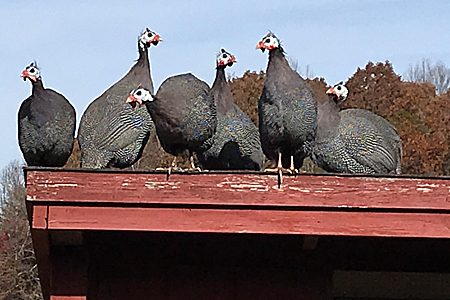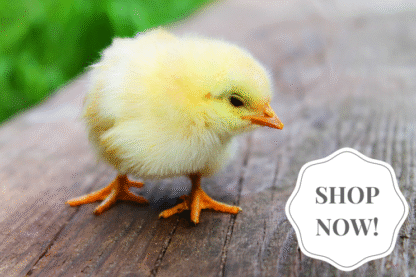
Guinea fowl are notoriously independent, often preferring to roost outdoors at night. They are more likely to perch high on a tree limb or on top of the coop roof, than to sleep inside, where they would be safe from owls and other night prowling predators. Getting guineas to go inside at night is the bane of many a guinea keeper.
Here are six tips for encouraging guinea fowl to sleep indoors:
Raise Keets with Chicks
One of the easiest ways to train guineas to sleep inside the coop is to raise baby guineas (keets) with chicken chicks. Training chickens to roost indoors is somewhat easier than training guineas. In turn, the chickens will train the guineas.
Light the Way
Guineas often want to linger outside after all the chickens have wandered indoors for the night. Having a light on inside the coop encourages the guineas to move toward the light as sunlight fades. If the coop has an automatically closing pop-hole door, set it to close a little later to ensure the door doesn’t close before the guineas decide it’s time to go in.
Avoid Big Changes
Guinea fowl are quick to detect any change that could possibly be interpreted as representing danger. If their coop usually has a light on in early evening, and the light fails, the guineas know something is wrong and likely will not go in that night. If they share a coop with chickens, and the chickens are removed, guineas take that as a sign the coop is no longer safe and may refuse to enter. Take measures to avoid such potentially stressful situations.
Provide High Roosting Perches
The reason guineas tend to roost in trees is that they feel safest in high places. If they feel the perches inside the coop are not high enough, they will seek other roosting spots. The roost height for guinea fowl should be at least four feet above the coop floor. If the coop is fitted with graduated, ladder-like roosts, guineas always find their way to the top rungs.
Feed Them at Night
Guinea fowl, like other poultry, tend to chow down toward evening, to avoid going hungry overnight. A good way to train guineas to go inside is to feed them in the late afternoon, rather than in the morning. When they hear the feed bucket rattle, they’ll scurry inside for dinner. Or you might toss a handful of scratch grain into the coop near sundown and close the door when the guineas scramble indoors for the grain. After a few nights, they will learn to go in on their own.
Talk Them Down
As farfetched as this might sound, sometimes you can talk guineas into roosting indoors. That, of course, takes the patience of Job. But if you develop a good rapport with the birds while they’re keets, they will learn to take comfort in the sound of your voice. And they just may listen when you try to convince them that roosting indoors is the best plan for the sake of their own safety.
And that’s today’s news from the Cackle Coop.
Gail Damerow, author, What’s Killing My Chickens?


I read somewhere that Guineas do not eat ticks but I don’t have any ticks on our property and neither do any of our neighbors as long as we have Guineas, at one time we had ended up for a short time and it didn’t take long and the ticks were back so I vowed that as long as I lived we would have Guineas and we got more and are tick free once again and that means a lot to me since I raise and show Pugs
During the day my hens are in chicken tractors and moved every 2 hr. have access to water in the tractor . when we take the hens back to kennel and coop the malescome right along (No trouble) open the kennel and in everybody goes to eat an then to roost. My wife says “GET TO BED” and up on the roost they go. Close and lock the coop door and then close and lock the kennel doors. Been doing this for the past 9 years and do this process with every hatch. we currently have 18 Guinea keets being raised with 6 chicken chicks.
Our guinea (14) have been raised since keets alongside the chicks. They have their own coops, however The past week a big male isn’t letting some of the guinea back into the coop. Once he perches they run in. Any siggestions?
It sounds like he’s simply establishing his dominance, especially if the ones he’s not allowing back in are other males. I wouldn’t worry about it or intervene unless they become violent.
Hi! We have 13 guinea fowl and have raised them from keets alongside 14 chicks. (Same coop but separate enclosure). Our guineas are now 6 weeks old and we are trying to figure out the best way to release them and insure that they will return to the coop at night. I have two points of concern:
1. Is our pop hole the appropriate size and in a suitable location? Pop hole is approximately 10″ x 12″ and located approximately 6′ above ground. (My husband mounted a landing board and small perch on the exterior for them to fly up to and land on before entering).
2. We have 12 acres (woodland/corn/grassland) how can I encourage the guineas to stay close to home and eat the bugs out of my vegetable garden / perennial beds vs flying straight for the woods?
So far, we have let out just one guinea at a time, and they run straight for the woods. They have never made their way back into the coop pop hole, though they have wandered back to the coop where we have been able to catch them and return them to their pen.
I would recommend keeping them in a pen for 2-3 months so that they know where home is. You’ll want to feed them at the same time every night, go out and rattle a can (some noise they’ll become familiar with). A friend throws food into the coop at that point and they go right in. After awhile, their keets would be waiting in the coop to be fed. I definitely think 6 weeks is way too young to be letting out to free range if you want them to come home. A 6′ high entrance for them may be a bit high for you to throw food in for them. Good luck!
Definitely agree with the comment below, I kept our guineas penned and cooped or three months. I used a wire enclosure to give them a rotation access to grass in my yard. They free-range beautifully and come home before dark :). I call them “babikins” and they come running even if they are deep in our woods. On that note, pay attention to when the males get loud, I lost a female to a fox when I thought they were just being drama queens. 🙁
Use your phone and YouTube with female or male call sounds to attract your guineas to the coop if you have trouble catching them after free ranging.